
GEORGE ZIMMERMAN FOUND NOT GUILTY OF MURDER IN TRAYVON MARTIN'S DEATH
Greg Botelho and Holly Yan, CNN
he George Zimmerman trial: What happened? What's next? Watch an Anderson Cooper 360 special tonight at 8 ET on CNN.
(CNN) -- George Zimmerman never denied shooting Trayvon Martin, but he said he did so in self defense. Late Saturday night, a Florida jury found him not guilty in the teenager's death.
The verdict caps a case that has inflamed passions for well over a year, much of it focused on race.
The six jurors -- all of them women -- deliberated for 16½ hours. Five of the women are white; one is a minority.
When he heard his fate, Zimmerman had little visible reaction. He turned and shook the hand of one of his attorneys before sitting back down, smiling only after court was adjourned.
Martin's parents, Tracy Martin and Sybrina Fulton, were not in the courtroom when the decision was announced. But they shared their emotions on Twitter shortly afterward.
"Even though I am broken hearted my faith is unshattered I WILL ALWAYS LOVE MY BABY TRAY," Tracy Martin tweeted.
Martin's dad: My heart is broken
Zimmerman's brother, Robert Zimmerman Jr., said words can't express how relieved his family is.
"Having said that, I don't think this is a time for high-fiving," the brother said. "I acknowledge -- we all have acknowledged -- that Mr. Martin, Trayvon Martin, lost his life. (But) it was not an act of murder. It was not an act of manslaughter."
The decision
The jury had three choices: to find Zimmerman guilty of second-degree murder; to find him guilty of a lesser charge of manslaughter; or to find him not guilty.
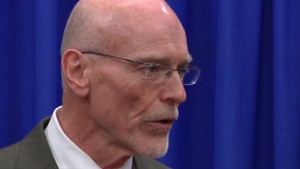 Defense: Prosecution was 'disgraceful'
Defense: Prosecution was 'disgraceful'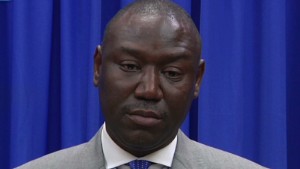 Martin lawyer: 'We must all be peaceful'
Martin lawyer: 'We must all be peaceful'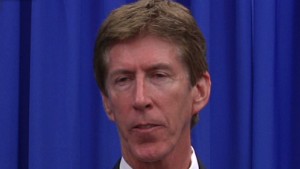 Defense: Zimmerman did nothing wrong
Defense: Zimmerman did nothing wrong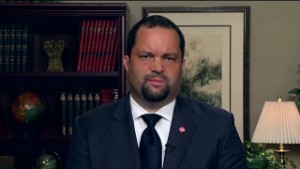 'Outrage' over Zimmerman verdict
'Outrage' over Zimmerman verdict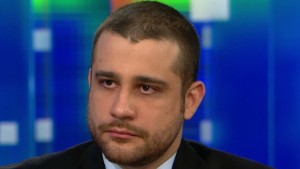 Zimmerman's brother reacts to verdict
Zimmerman's brother reacts to verdict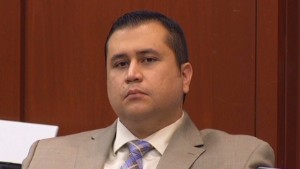 Get caught up: Zimmerman trial in 3 mins
Get caught up: Zimmerman trial in 3 mins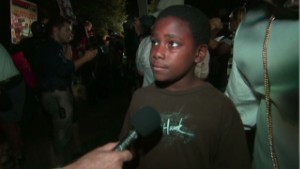 Father and son react to verdict
Father and son react to verdict For second-degree murder, the jurors would have had to believe that Martin's unlawful killing was "done from ill will, hatred, spite or an evil intent" and would be "of such a nature that the act itself indicates an indifference to human life."
What led jurors to this verdict?
To convict Zimmerman of manslaughter, the jurors would have had to believe he "intentionally committed an act or acts that caused the death of Trayvon Martin." That charge could have carried a sentence of up to 30 years in prison, though the jury was not told of that possible sentence.
Ultimately, they believed Zimmerman wasn't guilty of either charge. None of the jurors wanted to speak to the media after the verdict.
A call for calm
Both sides of the case asked for peace after the verdict. In the immediate aftermath, they appeared to have gotten their wish -- even though the Internet erupted with outrage.
But now that Zimmerman is a free man, his defense and his brother fear for his safety.
"He has to be very cautious and protective of his safety because there is still a fringe element who have said, at least in tweets and everything else, that they want revenge -- that they will not listen to a verdict of not guilty," defense attorney Mark O'Mara said.
Anger, sadness but little surprise
Robert Zimmerman Jr. said his brother "is going to be looking around his shoulder for the rest of his life."
When asked if George Zimmerman will keep the gun he used to shoot Trayvon Martin, his brother said he has good reason to.
"I think he has more reason now than ever to think that people are trying to kill him because they express they're trying to kill him, all the time, every day, on my Twitter feed, on the Internet," Robert Zimmerman told CNN's Piers Morgan.
"He has always feared for his safety."
But Crump said everyone should stay calm, especially for Martin's sake.
"For Trayvon to rest in peace, we must all be peaceful."
The race debate
The trial may be over, but the race debate surrounding the case rages on.
"The whole world was looking at this case for a reason ... We'd be intellectually dishonest if we didn't acknowledge the racial undertones in this case," Martin family attorney Benjamin Crump said. "So we have to have very responsible conversations about how we get better as a country and move forward from this tragedy and learn from it."
Prosecutor Angela Corey said Martin was unfairly viewed as a criminal before he was shot.
Analysis: The role that race played
Amid the national debate about whether Zimmerman racially profiled Martin, defense attorney O'Mara suggested his client was actually profiled by critics.
"I think things would have been different if George Zimmerman were black for this reason: He never would have been charged with a crime," O'Mara said.
He said the country "absolutely" needs to have a conversation about whether young black males are treated differently in the criminal justice system -- but said that conversation is a separate topic from what happened the night Zimmerman and Martin met.
Sports stars sound off on verdict
Martin family attorney Natalie Jackson commended the millions of people who signed an online petition "not in an effort to persecute George Zimmerman, but in an effort to say a black 17-year-old child should be able to walk home from the store and not be shot."
She said their efforts were not in vain.
"I don't want them to be discouraged because I think they may have saved the life of another child," Jackson said. "I think that from now on, if there is someone who wants to follow someone with a gun, I think they'll think twice about it."
The fateful night
The deadly encounter took place on February 26, 2012, as Martin walked back to his father's fiancee's house through the rain from a Sanford convenience store. The 17-year-old was carrying Skittles and a drink.
Zimmerman, a neighborhood watch volunteer, spotted him and called police.
A 911 dispatcher told Zimmerman that officers were on the way and not to follow the allegedly suspicious person. But Zimmerman still got out of his car, later telling police he just wanted to get a definitive address to relay to authorities.
Sometime after that, Zimmerman and Martin got into a physical altercation. Questions later arose about who was the aggressor, about whether Martin may have seen or reached for Zimmerman's gun, and about whether Zimmerman should have had more injuries if he was pummeled, as he claims.
Prosecutors never accused Zimmerman, who identifies himself as Hispanic, of being racist. But they did argue that he wrongly and spitefully prejudged Martin as one of those "f***ing punks," as he's heard saying under his breath in his call to police.
"The defendant didn't shoot Trayvon Martin because he had to," Assistant State Attorney John Guy said. "He shot him because he wanted to. That's the bottom line."
The defense contended that Martin jumped out of some bushes and pounced on Zimmerman as he was walking back toward his car that night, then punched him and slammed his head repeatedly into the concrete sidewalk.
Zimmerman's account of what happened the night of the shooting was a central part of the trial. He was the only living person who witnessed the entire incident, and there wasn't much physical evidence for either team to fall back on.
What's next?
The NAACP has called for the Justice Department to file civil rights charges against Zimmerman and urged the public to sign a petition to support the effort.
"The most fundamental of civil rights -- the right to life -- was violated the night George Zimmerman stalked and then took the life of Trayvon Martin," the advocacy group said in a statement.
O'Mara said if anyone tries to sue Zimmerman, "we will seek and we will get civil immunity in a civil hearing. And we will see just how many civil lawsuits have spawned from this fiasco."
But for now, both families will reflect and try to move forward.
"Trayvon Martin will forever remain in the annals of history next to Medgar Evers and Emmett Till as symbols for the fight for equal justice for all," Crump said.
When asked what he has to say to Trayvon Martin's parents, Robert Zimmerman Jr. said he understands their pain.
"There are no winners. They will not win or lose anything more than they already have lost, which is their son's life, by any kind of verdict for George," Robert Zimmerman said. "I applaud them for asking for the verdict to be respected. ... And I will pray for them."
HLN's Grace Wong, Graham Winch, Amanda Sloane, Jonathan Anker and Anna Lanfreschi and CNN's Mariano Castillo, Chelsea J. Carter, John Couwels and Mayra Cuevas contributed to this report.
VIEW VIDEO
http://www.cnn.com/2013/07/13/justice/zimmerman-trial
